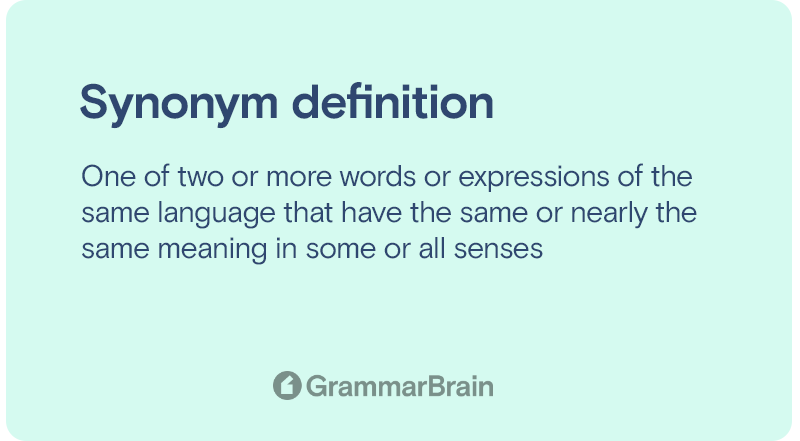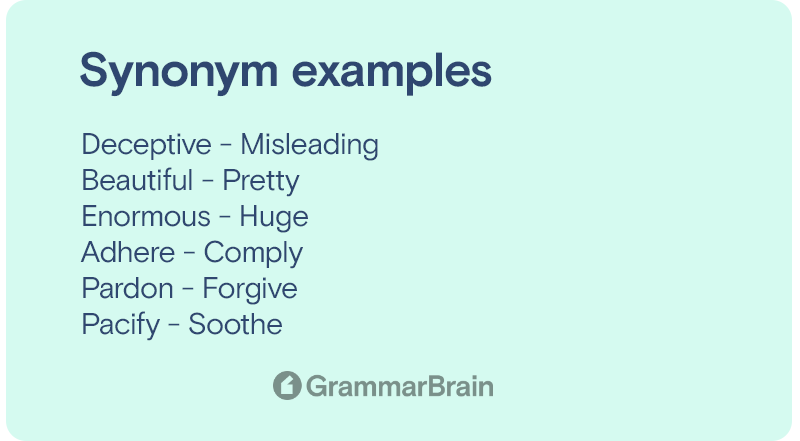What are the various types of synonyms in the English language? A term is said to be a synonym if it shares the exact same meaning as another word. For instance, the terms “drink” and “beverage” are synonymous with one another. Both terms refer to the same concept and can be utilized in the same context.

Definition of synonyms
Different words that share the same or very similar meanings are referred to as synonyms. They can take the form of any part of speech, from nouns to verbs to adjectives to adverbs and even prepositions.
| Form | Definition |
| Synonym | One of two or more words or expressions of the same language that have the same or nearly the same meaning in some or all senses |
How many types of synonyms are there?
There are synonyms whose meanings are identical to one another, while others have meanings that are extremely close to one another.
Keeping this in mind, we can classify synonyms into one of three categories, determined by the degree to which the meanings of the terms are comparable to one another.
Type 1: Absolute synonyms
Absolute synonyms are two different terms that are used to denote precisely the same thing; there is no variation in the meaning between the two.
Absolute synonyms can be interchanged with one another; one synonym can stand in for the other without affecting the meaning in any way.
Type 2: Synonyms made up of parts
Words that are considered to be partial synonyms mean almost the same thing, with the distinctions being relatively minor.
One word can be a particular instance of a more general word, such as the distinction between good and excellent. The separating factor can be a degree or amount, such as the gap between good and excellent.
When you change one word in a sentence with its partial synonym, the meaning shifts slightly but does not significantly alter the overall message.
Type 3: Closely related synonyms
Words are considered to be near synonyms when their meanings are distinct from one another but are nonetheless connected in some way. These two words cannot be substituted for one another in any context.
When one word is changed to a close synonym of another, the meaning of the sentence is altered.
On the other hand, given their close relationship, a word that is a near synonym might serve as a superior and more accurate alternative to the original.

Examples of some synonyms
The following is a list of some examples of synonyms:
- Deceptive – Misleading
- Beautiful – Pretty
- Enormous – Huge
- Adhere – Comply
- Pardon – Forgive
- Pacify – Soothe
- Insane – Silly
- Active – Engaged
- Competent – Able
- Charm – Fascinate
- Include – Contain
- Deny – Oppose
- Spend – Pay
- Detest – Despise
- Cruel – Fierce
- Appalling – Atrocious
- Peril – Danger
- Meed – Timid
- Diminish – Deteriorate
- Just – Unbiased
- Dull – Boring
- Young – Tender
- Man – Male
- Women – Female
- Child – Infant
Do synonyms exist for every word?
Synonyms are not available for every single word or phrase. Primitives are words that are easy to understand and that have clear etymologies. In most cases, there exist alternative meanings for these words.
Words used in the scientific and technical communities are frequently one of a kind and do not have any close equivalents.
Where can I look for synonyms?
Thesaurus is a specialist reference book (or online site) that organizes terms by synonyms, related words, and related concepts. It is the finest tool for discovering ordered lists of synonyms.
The definition of a word can be found in a dictionary, whereas all of the various permutations of a word’s meaning can be found in a thesaurus (verb, noun, phrase).
Multiple interpretations and alternative names
It’s possible for two words to share the same meaning, but a single word might have many different connotations.
Homonyms or homophones are terms that refer to pairs of words that share the same pronunciation but not the same spelling or punctuation.
Why use synonyms?
Synonyms help avoid using the same word too frequently in a passage. This will keep the passage interesting and prevent monotony from setting in.
When using synonyms, the connotation of the synonym should be appropriate for the writing style.
FAQs
1. What are synonyms?
Words with meanings that are the same as or very similar to another term are called synonyms. For instance, another word that means the same thing as ‘teach’ is educate, even though the two words themselves are not interchangeable.
2. When is the use of synonyms appropriate?
There are primarily two applications for synonyms. To begin, using synonyms can assist you in finding a word choice that is a better fit for the meaning that you are attempting to communicate.
Second, using them will bring more diversity to your writing and steer clear of overusing the same word.
3. Can you explain the different categories of synonyms?
There are three basic categories of synonyms based on how well the meanings of the words match up with one another.
Absolute synonyms and Partial synonyms have meanings that are very similar to one another. Near synonyms have meanings that are distinct from one another but are related to one another.
Near synonyms and Absolute synonyms share the same precise meaning.
Sources
- Synonyms | Definition & Examples
- Synonyms And Antonyms List For English Language Section
- Difference Between Synonyms and Antonyms
- What is a synonym?
- Types of Synonyms
- Synonym: Definition and Examples
Inside this article
Fact checked:
Content is rigorously reviewed by a team of qualified and experienced fact checkers. Fact checkers review articles for factual accuracy, relevance, and timeliness. Learn more.
Core lessons
Glossary
- Abstract Noun
- Accusative Case
- Anecdote
- Antonym
- Active Sentence
- Adverb
- Adjective
- Allegory
- Alliteration
- Adjective Clause
- Adjective Phrase
- Ampersand
- Anastrophe
- Adverbial Clause
- Appositive Phrase
- Clause
- Compound Adjective
- Complex Sentence
- Compound Words
- Compound Predicate
- Common Noun
- Comparative Adjective
- Comparative and Superlative
- Compound Noun
- Compound Subject
- Compound Sentence
- Copular Verb
- Collective Noun
- Colloquialism
- Conciseness
- Consonance
- Conditional
- Concrete Noun
- Conjunction
- Conjugation
- Conditional Sentence
- Comma Splice
- Correlative Conjunction
- Coordinating Conjunction
- Coordinate Adjective
- Cumulative Adjective
- Dative Case
- Determiner
- Declarative Sentence
- Declarative Statement
- Direct Object Pronoun
- Direct Object
- Diction
- Diphthong
- Dangling Modifier
- Demonstrative Pronoun
- Demonstrative Adjective
- Direct Characterization
- Definite Article
- Doublespeak
- False Dilemma Fallacy
- Future Perfect Progressive
- Future Simple
- Future Perfect Continuous
- Future Perfect
- First Conditional
- Irregular Adjective
- Irregular Verb
- Imperative Sentence
- Indefinite Article
- Intransitive Verb
- Introductory Phrase
- Indefinite Pronoun
- Indirect Characterization
- Interrogative Sentence
- Intensive Pronoun
- Inanimate Object
- Indefinite Tense
- Infinitive Phrase
- Interjection
- Intensifier
- Infinitive
- Indicative Mood
- Participle
- Parallelism
- Prepositional Phrase
- Past Simple Tense
- Past Continuous Tense
- Past Perfect Tense
- Past Progressive Tense
- Present Simple Tense
- Present Perfect Tense
- Personal Pronoun
- Personification
- Persuasive Writing
- Parallel Structure
- Phrasal Verb
- Predicate Adjective
- Predicate Nominative
- Phonetic Language
- Plural Noun
- Punctuation
- Punctuation Marks
- Preposition
- Preposition of Place
- Parts of Speech
- Possessive Adjective
- Possessive Determiner
- Possessive Case
- Possessive Noun
- Proper Adjective
- Proper Noun
- Present Participle
- Prefix
- Predicate



